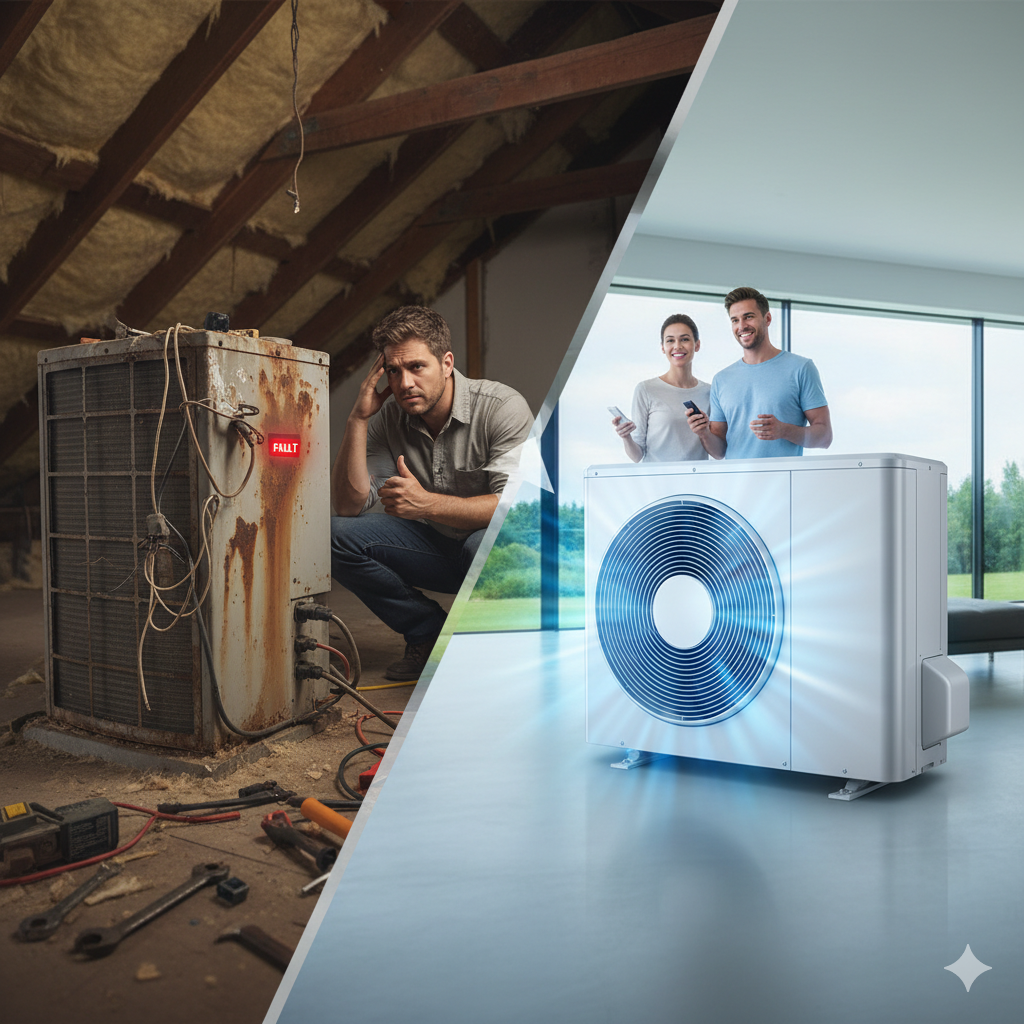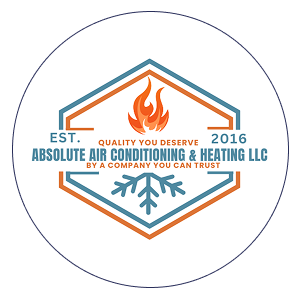Deciding between repairing an aging air conditioner and investing in a new, energy-efficient replacement can determine your utility bills, home comfort, and long-term savings. This guide explores the key signs of failure, cost comparisons, efficiency gains, sizing considerations, industry trends for 2025, decision-making tools, and preventive maintenance. You’ll learn how AC unit age, frequent breakdowns, refrigerant regulations, SEER ratings, and smart HVAC features influence whether to repair or replace. By understanding these factors and leveraging practical rules like the 50 Percent Rule or an interactive replacement calculator, homeowners can make a confident choice that balances upfront expense, energy savings, indoor air quality improvements, and future-proof performance.
How Do You Know When to Repair or Replace Your AC Unit?
Determining whether to repair or replace an AC unit requires evaluating age, repair frequency, operating noise, and refrigerant type. An AC over 10–15 years old often loses efficiency and incurs escalating repair costs that outweigh benefits. Frequent component failures—such as compressor or fan motor breakdowns—signal diminished reliability and creeping comfort issues. Noisy operation and inconsistent cooling further erode living conditions. Units still using phased-out R-22 refrigerant face service scarcity and rising parts expenses. Homeowners prioritizing stable indoor temperatures, quieter performance, and regulatory compliance should consider replacement once annual repair bills exceed half the cost of a new installation or when comfort declines sharply.
When evaluating total service quality and reliability, homeowners often refer to The Ultimate Guide to Air Conditioning Service in Las Vegas, which outlines how professional maintenance can delay costly replacements and maintain optimal performance.
What Are the Key Signs You Need a New AC?
Uneven airflow, persistent high humidity, rising energy bills, and repeated compressor failures are prime indicators that a new air conditioner will restore efficiency and reduce downtime. When repairs become routine rather than rare, replacement ensures reliable comfort.
How Does AC Unit Age Affect Repair vs Replacement Decisions?
An AC unit’s expected lifespan—typically 15–20 years—frames repair viability. Units older than 12 years often lose their original SEER efficiency, making replacement the more cost-effective option over ongoing repairs.
For those curious about system longevity and upkeep frequency, understanding How Often Should You Service Your Air Conditioner? can help balance maintenance schedules and long-term replacement planning.
What Is the Impact of Frequent Breakdowns and Noisy Operation?
Frequent breakdowns disrupt comfort and inflate service calls. Noisy compressors or rattling ducts signal mechanical wear and compromised indoor air quality, undermining the system’s core function of delivering quiet, consistent cooling.
How Does Outdated Refrigerant Influence Replacement Timing?
R-22 refrigerant phase-out increases repair costs and reduces available parts. Transitioning to modern, low-GWP refrigerants like R-454B or R-32 often requires a full system replacement to meet environmental regulations and efficiency standards.
Those assessing performance and tune-up benefits may also explore What Happens During a Professional AC Tune-Up?, which explains how targeted inspections prevent major component failures before replacement becomes necessary.
What Are the Costs Involved in AC Repair vs Replacement?
Comparing AC repair and replacement costs hinges on the 50 Percent Rule and the total lifecycle expense including installation, energy consumption, and maintenance. Repairing minor issues—capacitor replacements or refrigerant top-ups—can cost between $150 and $600, while compressor or coil repairs range from $800 to $1,500. A full replacement, including new unit, labor, and ductwork modifications, typically falls between $4,000 and $8,000 depending on capacity, brand, and region. Factoring in energy savings from high-SEER units can offset replacement costs within 3–7 years. Homeowners can use the 50 Percent Rule: if repair costs exceed 50 percent of a new system’s price, replacement is generally the wiser investment.
For clarity on whether to handle upkeep yourself or rely on a pro, DIY vs Professional AC Maintenance: What’s Worth It? breaks down the exact tasks homeowners can safely perform and those requiring certified expertise.
What Are the Benefits of Upgrading to a New Energy-Efficient AC Unit?
Upgrading to a modern air conditioner delivers multiple advantages: significant utility bill reductions, enhanced comfort through precise temperature control, and quieter operation. Advanced inverter technology allows variable-speed compressors to adjust output continuously, optimizing energy use and maintaining stable indoor conditions. Improved filtration systems enhance indoor air quality by capturing pollen, dust, and VOCs. Eco-friendly refrigerants with low global warming potential reduce environmental impact and future-proof compliance. New systems can boost property value and qualify homeowners for rebates or tax incentives. Integration with smart thermostats and IoT platforms enables remote monitoring, predictive maintenance alerts, and optimized scheduling for further savings.
Professionals often emphasize How Air Conditioning Affects Indoor Air Quality, as upgrading your unit also improves filtration, humidity control, and respiratory health inside your home.
What Are the Latest HVAC Industry Trends Impacting AC Replacement in 2025?
In 2025, evolving refrigerant regulations, smart HVAC adoption, and sustainability priorities are reshaping replacement decisions. The phase-out of R-410A in commercial sectors and increasing uptake of low-GWP blends like R-454B and R-32 accelerate system modernization. Predictive maintenance platforms leveraging IoT sensors and AI analytics detect inefficiencies early, reducing emergency calls and extending equipment life. Decarbonization goals drive interest in heat pump hybrids and geothermal cooling solutions. Inverter technology continues to dominate residential installations, accounting for over 70 percent of new sales due to superior modulation and efficiency. Enhanced air filtration modules address rising demand for indoor air quality in post-pandemic living environments.
When budgeting for upgrades or tune-ups, reviewing How Much Does Air Conditioning Service Cost? provides valuable insight into regional labor rates, unit pricing, and long-term operating costs.
Final Thoughts
Regular evaluation of AC age, repair history, refrigerant type, energy performance, and maintenance costs empowers homeowners to choose the most cost-effective path. Leveraging rules of thumb like the 50 Percent Rule and decision calculators, alongside understanding 2025 trends in refrigerant regulations and smart HVAC, ensures that your cooling solution from Absolute Air Conditioning delivers optimal savings, comfort, and sustainability for years to come.





